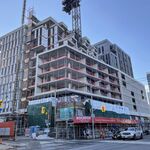Rainforest
Senior Member
It bugs me that the provincial and federal governments found $140M for roads in Ontario, as if that would really improve the commute in the GTA. Not.
All those improvements are for roads outside Toronto.
No road upgrades can improve commute within Toronto, but for almost any other place in Ontario, roads remain essential. The provincial and federal governments have to govern for all constituents, not just 416 residents.




